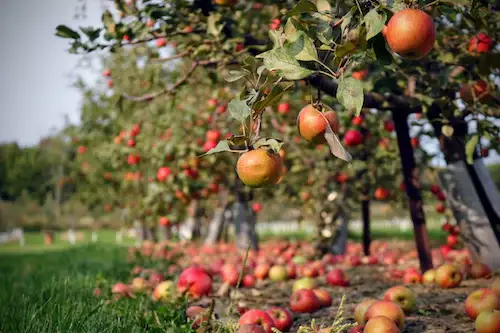What Is the Most Profitable Crop For a Small Farm? (For 5 Climates)
Small farms can maximize their earning potential and secure their long-term financial stability by growing the most profitable crop for a given climate. Let's explore the most profitable crops for small farms in five different climates, including their cost of production and other tips to maximize your profits.
In the tropics, coconuts are the most profitable crop, while apples thrive the most in temperate climates. In Mediterranean climates, olives are a good choice for a small farm. In subtropical climates, sorghum is profitable, while in arid climates, dates are the best to plant to get the most out of your small farm.
You can reap long-term rewards by growing the most profitable crops on your small farm in each climate. Read on to find out how to maximize crop production and profits on your small farm.
Summary
- Planting coconuts during the tropical season can give you an abundant harvest of 75 coconuts per year.
- Sorghum is easy to harvest and can produce high yields during the subtropical season.
- Growing the most profitable crops on your small farm in each climate can give you long-term benefits.

Most Profitable Crops For A Small Farm
For five different climates, the most profitable crops for a small farm are coconuts, apples, olives, sorghum, and dates. Each of these crops can bring a good source of income to every farmer in each season if harvested abundantly.
1. Grow coconuts in tropical climates
Coconuts are a great crop to consider for small farms in tropical climates. They require minimal inputs and have a high return on investment. The coconut palm is naturally adapted to humid, coastal environments and can be grown in a wide range of soil types. With proper maintenance, coconuts can produce a steady income for years.
Coconuts produce a variety of products that can be sold or processed for added value. The most obvious product is the coconut itself, which can be sold fresh or processed for use in cooking and baking. Coconut water, coconut milk, coconut oil, and coconut cream are all popular products that can be produced from coconuts.
In addition, the husks and shells can be used as mulch or fertilizer, while the leaves can be used in craft projects or as animal feed. Coconuts are also relatively easy to harvest, with a single tree producing up to 75 coconuts per year. This makes them an ideal crop for small-scale farmers, as they are easy to manage and maintain.
Furthermore, there is a large demand for coconuts, particularly in regions where coconuts are native, so farmers can easily find a market for their products.
2. Grow appples in temperate regions
Apples are one of the most profitable crops for small farms in temperate climates. Apples are well suited for temperate climates because they require a cold winter and a cool summer for successful growth.
Apples can be grown in a variety of soils, and the trees are relatively easy to care for and maintain. They are also a popular fruit, and there is a wide range of uses for them, from fresh eating to making cider, pies, and other products.
Apples also have a long shelf life, allowing them to be stored and sold over an extended period of time. This makes them an ideal crop for small farms, as they can be harvested when ripe and sold over time instead of having to be sold all at once. Apples are also a very profitable crop, with the potential to generate a high rate of return on investment.

3. Plant olive trees in Mediterranean areas
Olive trees are one of the most profitable crops for small farms in Mediterranean climates. Olive trees are hardy plants that are well adapted to the hot, dry climate of the Mediterranean and require minimal irrigation, making them an ideal crop for small-scale farmers.
Olives are also a long-term crop, with some trees producing olives for hundreds of years. This longevity ensures a steady stream of income for farmers over the years. Olive trees are also easy to care for, requiring minimal input and labor.
In addition to being low-maintenance, olive trees are highly productive, yielding up to 15 kilograms of olives per tree annually. The olives can be used for a variety of purposes, including olive oil, green table olives, and pickled olives, all of which can be sold commercially.
In addition to the potential for high yields and low maintenance, olives are a profitable crop because of their high market value. Olive oil is highly sought after, and prices can be quite high, especially for premium quality extra-virgin oil. The demand for olives is also high, with olives being used in many culinary dishes, as well as for olive oil and other products.
4. Grow sorghum in subtropical areas
Sorghum is one of the most profitable crops for small farms in subtropical climates. This cereal grain is well adapted to hot, dry conditions and is capable of producing high yields with minimal inputs. In addition to its drought tolerance, sorghum has the potential to out-yield many other kinds of cereal due to its deep, complex root system that can access water and nutrients from deeper soil layers.
Sorghum is an ideal crop for small farm operations in subtropical climates as it is highly profitable. The grain can be used as feed for livestock, or processed into a range of food products, providing a good source of income for small farmers.
In addition, sorghum can be used as a cover crop, which can help reduce soil erosion, improve water infiltration, and provide a food source for beneficial insects. Sorghum is a versatile crop that can be grown using a variety of cultural practices.
It can be planted in a variety of soils and grown with minimal inputs, making it an economical choice for small farms. The grain is also relatively easy to harvest and store, which makes it a great choice for small-scale operations.
5. Farm dates in arid climates
Dates are one of the most profitable crops for small farms in arid climates. Dates have a long growing season and a high yield, making them an ideal crop for small farms in dry areas. Dates require minimal water and can be grown in a variety of soil types, making them an ideal crop for dry climates.
Dates are also a versatile crop. They can be eaten fresh, dried, canned, or used in a variety of recipes. Dates can also be processed into a variety of products, such as molasses, sugar, syrup, and alcohol. This versatility makes dates a profitable crop for small farms in arid climates.
Furthermore, dates are a nutritious food. They are high in fiber, vitamins, and minerals. Dates also contain antioxidants, which can help reduce the risk of certain diseases. This makes dates a popular choice for health-conscious consumers, which can further boost the profitability of small farms in arid climates.

Benefits of Growing The Most Profitable Crop
You can gain numerous benefits from planting the most profitable crop on your small farm.
Increased profitability
Growing the most profitable crop for a particular climate allows small farms to maximize their earning potential and ensure their financial stability over the long term.
Improved productivity
Growing the most profitable crop can also lead to improved yields due to better soil fertility, pest management, and other factors.
Increased sustainability
By growing the most profitable crop, small farms can reduce their environmental impact by utilizing fewer pesticides and chemicals and by reducing the amount of energy and resources needed to produce the crop.
More resilience
Growing the most profitable crop can help small farms become more resilient to changes in the climate and market prices, allowing them to remain viable for the long term.
Diversified crops
Growing the most profitable crop can help small farms diversify their crops, which can help reduce the risk of crop failure due to weather, pests, or other factors.
